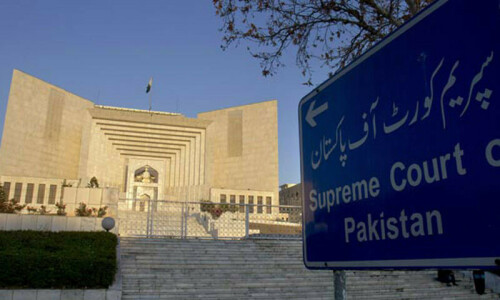ANKARA: A legal battle to ban Turkey’s ruling party could usher in a period of political instability and deepen the already bitter rift between the Islamist-rooted government and secularist forces, analysts said on Thursday.
Turkey’s top prosecutor last week asked the constitutional court to shut down the Justice and Development Party (AKP) for anti-secular activities and bar 71 of its members, including Prime Minister Recep Tayyip Erdogan, from politics for five years.
The court, which has banned more than 20 parties since the 1960s, is to decide in the coming days whether to hear the case.
If it does, a final verdict is expected to take up to six months.
“Political tension and uncertainty are set to rise in Turkey... The main takeaway, regardless of the final outcome, is that the lawsuit will seriously affect political stability,” Wolfango Piccoli from Eurasia group, a political risk consultancy firm in London, said in a note to investors.
The case “pushes Turkey into an adventure” at a time when the AKP is the dominant force with the charismatic Erdogan at the helm, political analyst Rusen Cakir said.
“If the court shuts down the AKP, the core issue will be whether Erdogan will be barred from politics or not,” he said. “At the moment there is no alternative to the AKP or Erdogan.” Erdogan, a political firebrand who once served jail time for religious sedition, created the AKP in 2001 from the ashes of a banned Islamist movement after disavowing past radical views and describing himself as a conservative democrat.
The party rode to power a year later and won praise for consolidating the recovery from a severe recession under an IMF-backed plan, adopting a slate of democratic reforms and beginning membership talks with the European Union.
But a first term in office was also marked by tensions with Turkey’s secular establishment the army, judiciary and academia which suspects the party of having a secret agenda to undermine Turkey’s strictly secular system.
AKP rejects the charges.
Tensions peaked last year when the AKP tried to install one of its own as president and the secularist camp forced Erdogan to call snap polls. The AKP came out with nearly 47 per cent of the vote and a second-term in power.
If the AKP is banned, its deputies would likely set up a new party, but its success would depend on whether Erdogan remains a political actor or not, Piccoli said.
“If Erdogan were to be banned, in the best case scenario the party... would find it very difficult to maintain AKP’s popularity and to replicate its electoral successes,” he said.
That could raise the risk of Turkey being governed by weak and unstable coalition governments.
If the court rules out a ban, the AKP may feel emboldened to take steps that could further raise tensions with secularists forces, analysts say.
“If the court spares the AKP, it will be a confirmation that the party is not a centre of anti-secular activities and clear the way for the AKP for a very long time,” Cakir said.
The AKP, buoyed by it re-election, pushed a controversial amendment through parliament last month allowing university students to wear the Islamic headscarf.
The reform, which has already been challenged in the constitutional court, is seen by secularists of evidence that the AKP is turning its religious rhetoric into action.
It was this kind of “arrogance that has led AKP to overplay its hand since its re-election in July 2007, which has helped to land Prime Minister Erdogan’s party in the current crisis,” Piccoli said.
According to Husamettin Cindoruk, a former parliament speaker, the lawsuit is an opportunity for the AKP to prove that it has no designs against the secular system and put an end to the crippling debate in Turkey.
“The AKP should at once accelerate democratic reforms. If it does, it will eliminate doubts among members of the constitutional court and the public on whether Turkey is moving towards an Islamist rule,” he said.—AFP












































Dear visitor, the comments section is undergoing an overhaul and will return soon.